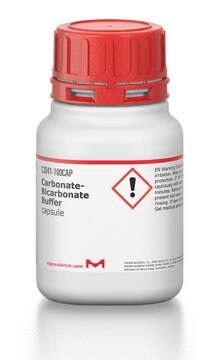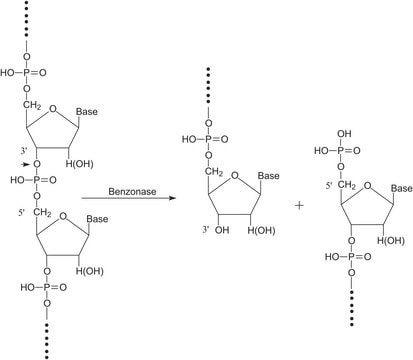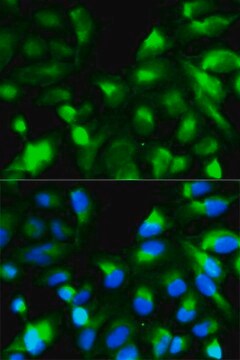S9684
Anti-SNAP-25 antibody produced in rabbit
IgG fraction of antiserum, buffered aqueous solution
About This Item
Produits recommandés
Source biologique
rabbit
Niveau de qualité
Conjugué
unconjugated
Forme d'anticorps
IgG fraction of antiserum
Type de produit anticorps
primary antibodies
Clone
polyclonal
Forme
buffered aqueous solution
Poids mol.
antigen 25 kDa
Espèces réactives
rat, mouse
Conditionnement
antibody small pack of 25 μL
Technique(s)
immunohistochemistry (formalin-fixed, paraffin-embedded sections): 1:5,000 using rat cerebellum sections
microarray: suitable
western blot: 1:10,000 using rat pheochromocytoma PC12 cell extract
western blot: 1:5,000 using mouse brain extract
Numéro d'accès UniProt
Conditions d'expédition
dry ice
Température de stockage
−20°C
Modification post-traductionnelle de la cible
unmodified
Informations sur le gène
human ... SNAP25(6616)
mouse ... Snap25(20614)
rat ... Snap25(25012)
Description générale
Anti-SNAP-25 is developed in rabbit using a synthetic peptide corresponding to the N-terminus of human SNAP-25 conjugated to KLH as immunogen. This sequence is identical in SNAP-25 alternatively spliced forms SNAP-25A and SNAP-25B, in mouse, rat and chicken SNAP-25 and highly conserved (80-85%) in goldfish and zebrafish SNAP25. Whole antiserum is fractionated and then further purified by ion-exchange chromatography to provide the IgG fraction of antiserum that is essentially free of other rabbit serum proteins. Anti-SNAP-25 recognizes mouse SNAP-25 (25 kD). The antibody cross-reacts with rat SNAP-25. Applications include the detection and localization of SNAP-25 (25 kDa) by immunoblotting and immunohistochemistry. Staining of SNAP-25 in immunoblotting is specifically inhibited with SNAP-25 immunizing peptide (SNAP-25, mouse)
Spécificité
Immunogène
Application
- the primary detection of SNAP-25
- enzyme-linked immunosorbent assay in human neuroblastoma cell lines
- immunohistochemistry
- in human neuronal cells using western blotting
Actions biochimiques/physiologiques
The molecular events leading to neurotransmitter release in the synaptic cleft are complex, involving multiple interacting proteins, generically termed SNAP receptors (SNAREs). It has been suggested that SNAP-25 and syntaxin on the neuronal plasma membrane (t-SNARE) and synaptobrevin/VAMP on the synaptic vesicle (v-SNARE) form a stable ternary complex. This core complex serves as a docking complex for two additional membrane fusion proteins, β-SNAP and NSF. ATP hydrolysis by NSF causes dissociation of the complex during priming of the exocytosis machinery. SNAP-25 induced reassembly and interaction with synaptotagmin (Syt), is thought to drive the Ca2+ -triggered vesicle-plasma membrane fusion and exocytosis. SNAP-25 has a key role in both developing and mature neurons. During development, SNAP-25 expression correlates with synaptogenesis, axonal growth and neuronal maturation and is found mainly in cell bodies of neonatal brain. In the adult nervous system, SNAP-25 is localized to presynaptic nerve terminals where it is conveyed by fast axonal transport.
SNAP-25 consists of two alternatively spliced isoforms SNAP-25a and SNAP-25b, differentially expressed in neurons and neuroendocrine cells. SNAP-25a and SNAP-25b differ by nine amino acids in the central domain. Two of these residues alter the relative positioning of clustered cysteine residues that are required for post-translational palmitoylation implicated in membrane anchoring, suggesting that the two SNAP-25 isoforms may play distinct roles in vesicular fusion events.
Forme physique
Stockage et stabilité
Clause de non-responsabilité
Vous ne trouvez pas le bon produit ?
Essayez notre Outil de sélection de produits.
Code de la classe de stockage
12 - Non Combustible Liquids
Classe de danger pour l'eau (WGK)
nwg
Point d'éclair (°F)
Not applicable
Point d'éclair (°C)
Not applicable
Équipement de protection individuelle
Eyeshields, Gloves, multi-purpose combination respirator cartridge (US)
Faites votre choix parmi les versions les plus récentes :
Déjà en possession de ce produit ?
Retrouvez la documentation relative aux produits que vous avez récemment achetés dans la Bibliothèque de documents.
Les clients ont également consulté
Notre équipe de scientifiques dispose d'une expérience dans tous les secteurs de la recherche, notamment en sciences de la vie, science des matériaux, synthèse chimique, chromatographie, analyse et dans de nombreux autres domaines..
Contacter notre Service technique














